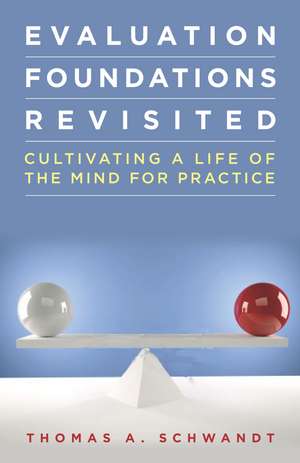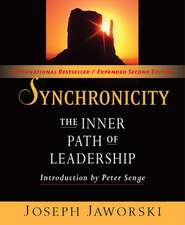Evaluation Foundations Revisited: Cultivating a Life of the Mind for Practice
Autor Thomas Schwandten Limba Engleză Paperback – 16 iun 2015
Thomas A. Schwandt shows how to critically engage with the assumptions that underlie how evaluators define and position their work, as well as how they argue for the usefulness of evaluation in society. He looks at issues such as the role of theory, how notions of value and valuing are understood, how evidence is used, how evaluation is related to politics, and what comprises scientific integrity. By coming to better understand the foundations of evaluation, readers will develop what Schwandt terms "a life of the mind of practice," which enables evaluators to draw on a more holistic view to develop reasoned arguments and well fitted techniques.
Preț: 475.30 lei
Nou
90.96€ • 98.77$ • 76.41£
Carte tipărită la comandă
Livrare economică 22 aprilie-06 mai
Specificații
ISBN-10: 0804786550
Pagini: 216
Dimensiuni: 152 x 229 x 20 mm
Greutate: 0.34 kg
Editura: Stanford University Press
Colecția Stanford Business Books
Recenzii
Notă biografică
Cuprins
This chapter introduces the idea of variability in professional evaluation practice. It provides an overview of four primary sources of variation: how evaluation is defined, what methods an evaluator ought to employ, how the professional evaluator relates to and interacts with parties to an evaluation, and how the purpose of the practice is understood. It concludes by suggesting that methodological and theoretical pluralism in evaluation requires more careful investigation.
This chapter argues that notions of "applying" theory to practice are mistaken and explains how theoretical knowledge (as a body of knowledge composed of concepts, principles, insights, etc.) serves as resource for practical decision making. It discusses several bodies of knowledge and their relevance for evaluation practice including evaluation theory, program theory, theory of use, causal theory, political theory, and theory of change.
This chapter begins with a short introduction to the difference between objectivist and subjectivist approaches to valuing. That is followed by a discussion of several issues involved in viewing evaluation as a judgment-oriented practice, grasping the relationship between values and criteria, using criteria as the basis for evaluative judgment, judging value when using multiple criteria, and determining the evaluator's role in making judgments.
The chapter first discusses judgment making in evaluation as a process of critical thinking that is guided by principles of scientific reasoning, method and evidence as well as ethical principles. It then turns to a discussion of evidence¿its definition, sources, and properties¿which forms the basis of judgments of value. That is followed by an examination of three salient issues surrounding the use of evidence in evaluation: (1) the controversy surrounding evidence-based policy and practice, (2) debates about establishing evidence of the causal effect of programs and policies, and (3) ensuring the use of adequate measures (i.e., sources of evidence) for determining program processes and outcomes. The chapter concludes with a discussion of key considerations involved in making evaluative arguments.
This chapter examines several distinct, but interrelated, ways of understanding the political character of evaluation. The discussion is organized from micro to macro-level considerations beginning with an "interior" look at politics in the conduct of evaluation planning and execution, then to assumptions evaluators hold about the politics of policymaking or the "politics of interaction," from there to considering evaluation as a means of governance, and finally to exploring the political point of view of evaluation itself.
This chapter draws on the considerable literature in both knowledge utilization and use of evaluation to identify prominent issues surrounding how use might be defined, the factors and circumstances that affect use, and the way in which different evaluation approaches position the idea of use in practice. The chapter concludes by arguing that the explanatory value of much the literature on use is meager although we can make several empirical generalizations about the phenomenon of knowledge use.
Evaluation practitioners face two important, interrelated issues. The first is what the trend toward professionalization of evaluation means for the practice in a global or international perspective. The second is what characterizes professionalism or professional conduct in evaluation. This chapter engages these two issues by first examining efforts aimed at developing competencies for what comprises a "good evaluator" and what might be involved in providing evidence that one who self identifies as an evaluator possesses them. It then examines criteria for determining what counts as a "good evaluation" and what it might mean for evaluation as a profession to offer some assurance that it engages in processes for quality assurance. The chapter ends with a discussion of the ethics of professional conduct.









